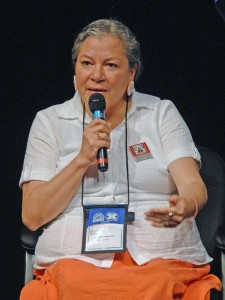By Karee Magee, The Bismark Tribune

BISMARCK, N.D. — A panel at the Tribal Leaders Summit on Thursday addressed problems facing the implementation of the Indian Child Welfare Act.
The mission of ICWA, first founded in 1978, is to keep or reunite Indian children with their families.
According to the National Indian Child Welfare Association’s description, the act was created in “response to the alarmingly high number of Indian children being removed from their homes by both public and private agencies.”
According to panelists, the numbers of Indian children put in foster homes remains high.
The consensus among the panelists is that the obstacle facing implementation of child welfare programs on reservations is lack of funding.
Sandra Bercier, interim director of the Native American Training Institute, said that because the programs are underfunded, they also are understaffed.
It is also hard to find permanent employees, said Leander McDonald, chairman of the Spirit Lake Tribe.
Child welfare programs are the hardest place to work, Bercier said, because staff sometimes take children out of homes.
Another significant problem is the lack of foster homes and families on the reservations, she said. Indian children who are taken from their families will often end up in a non-native family instead.
“If you have room in your home, hook up wth Indian Child Welfare,” Bercier said. “If we want ICWA to work, we have to be the ones to drive that process.”
The tribal leaders from South Dakota, though, emphasized an issue specific to that state.
“The problem is that there was this systemic institution that incentivized the removal of Indian children,” said Chase Iron Eyes, tribal judge of Lakota People Law Project.
According to Iron Eyes, the state of South Dakota earns $60 million from the federal government for the placement of Indian children into foster care.
South Dakota has a system of 48 hour hearings. The parents are required to go to court within 48 hours after their children were taken away, according to Tom Disselhorst, attorney for United Tribes Technical College.
The timespan doesn’t give them a chance to find a lawyer, he said, and they often don’t know why their children have been removed.
B.J. Jones said that the majority of these situations in South Dakota have nothing to do with abuse or neglect, but more often it is because the parent committed a misdemeanor like forgetting their license while driving.
He said society criminalizes poverty and Indian mothers are now afraid to drive because, if they are stopped by the police, their child could be taken away.
The Oglala Sioux Tribe and the Rosebud Sioux Tribe have filed a class action lawsuit against the state of South Dakota, and hope it will be part of the solution. They are accusing state officials of violating the Fifth Amendment by not providing opportunities for due process.
Due process includes that an attorney is required in court, which many Indian parents don’t have in the 48-hour hearings.
If the lawsuit reaches the 8th Circuit Court of Appeals, it may require other states to change their policies as well, said Disselhorst.
